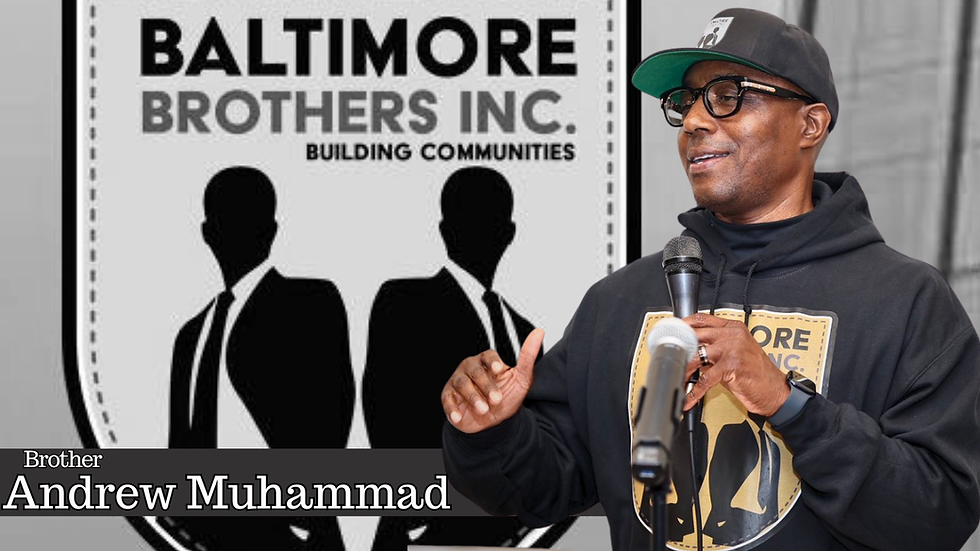Breaking the Silence: Suicide and Mental Health in the Black Community
- Brother Levon X

- Jan 12
- 4 min read

Suicide. It’s not a topic we talk about often enough in our community, but it’s one we can’t afford to ignore. Too many of us—our brothers, sisters, friends, coworkers—are struggling in silence, carrying burdens they feel no one can see. It’s time we bring this conversation to the forefront because lives depend on it.
A Hidden Crisis
The statistics are heartbreaking. According to the National Institutes of Health, suicide is:
• The third-leading cause of death for Black youth aged 15-19.
• The fourth-leading cause of death for young adults aged 20-29.
• The eighth-leading cause of death for those aged 30-39.
These numbers hit especially hard for young Black men, who have some of the highest suicide rates. But behind every statistic is a story—a life cut short, a family devastated, a future unrealized.
So why is this happening? Why are so many of us feeling like life isn’t worth living?
The Weight We Carry
The challenges we face as a community are real. Financial stress, relationship struggles, grief, family trauma, and the pressures of systemic inequality can weigh heavily on anyone. For some, that weight can feel unbearable.
Add to this the stigma surrounding mental health in our community, and it’s no wonder so many of us feel like we’re fighting a battle we can’t win. Too often, we’re told to “just pray about it,” “man up,” or “keep pushing.” While faith and resilience are important, so is acknowledging when someone needs help.
How Can We Help?
Sometimes, it’s the simplest actions that make the biggest difference. If you notice someone in your circle withdrawing, acting differently, or expressing hopelessness, don’t brush it off. Reach out. Ask, “Are you OK?”
The Warning Signs
While every individual is different, there are common signs that someone may be struggling with depression or suicidal thoughts:
• Withdrawal: Pulling away from loved ones or activities they once enjoyed.
• Sudden mood changes: A drastic shift in mood, from extreme sadness to seeming calm, can be a red flag.
• Expressions of hopelessness: Statements like “I can’t go on” or “Life isn’t worth living.”
• Risky behaviors: Increased substance use or other reckless actions.
• Changes in sleep or eating habits: Sleeping too much, too little, or sudden weight fluctuations.
Here’s what you can do to support someone who might be struggling:
Listen with your heart: Don’t try to fix things right away. Sometimes, people just need someone to hear them without judgment.
Be present: A text, a call, or just sitting with someone can remind them they’re not alone.
Encourage professional help: Therapy isn’t a sign of weakness; it’s a tool for healing. Help them find a counselor or support group.
Stay connected: Depression can make people feel isolated. Regular check-ins can mean the world to someone who feels forgotten.
The Role of Substance Abuse
For some, substances like drugs or alcohol may feel like a way to escape life’s challenges. But they only offer temporary relief while deepening the pain in the long run. True healing comes from addressing the root causes of the struggle, not numbing it.
A Message of Hope
If you’re reading this and feeling like there’s no way out, please know this: You are not alone, and your life is worth living. Whatever you’re facing right now, it doesn’t define you, and it doesn’t have to be the end of your story.
You might feel like no one understands or that things will never get better—but there’s always hope, even when it’s hard to see. Starting over, asking for help, or even just making it through one more day can be the first step toward a brighter future.
God has given each of us a purpose, even when life feels overwhelming. It’s never too late to rediscover the good in the world and the light within yourself.
Breaking the Stigma
As a community, we must let go of the idea that struggling with mental health is something to be ashamed of. Showing vulnerability isn’t weakness—it’s courage. Let’s create spaces where people feel safe to share their pain, get the help they need, and feel supported.
We all have a role to play. Whether it’s reaching out to a loved one, checking on a coworker, or simply being more compassionate, we can make a difference.
You’re Not Alone
If you or someone you know is struggling with thoughts of suicide, please seek help immediately. The National Suicide Prevention Lifeline is available 24/7 at 1-800-273-TALK (1-800-273-8255) or by dialing 988 for mental health crisis support. Your life is precious, and help is just a call away.
Your life matters. You matter. Let’s look out for one another, break the silence, and choose compassion. Together, we can turn the tide and bring hope to those who need it most.
Let’s keep the conversation going. If this message resonates with you, share it with someone you care about. You never know whose life you might change with just a few words of love and encouragement.
Citations:
• National Institutes of Health (NIH): www.nih.gov
• National Suicide Prevention Lifeline: 988lifeline.org
• Substance Abuse and Mental Health Services Administration (SAMHSA): www.samhsa.gov





Comments